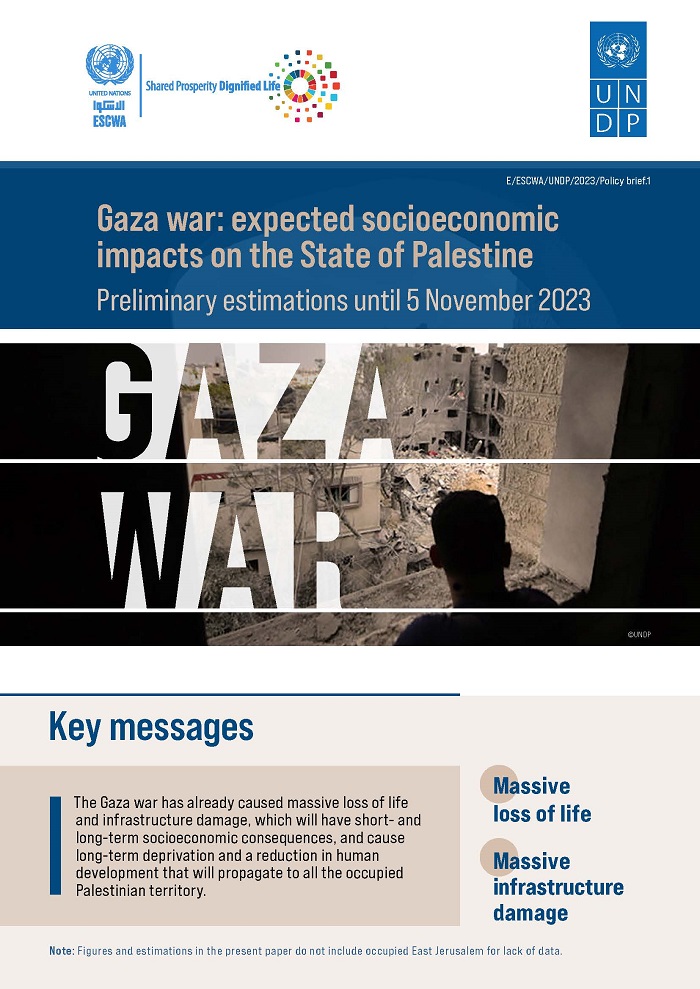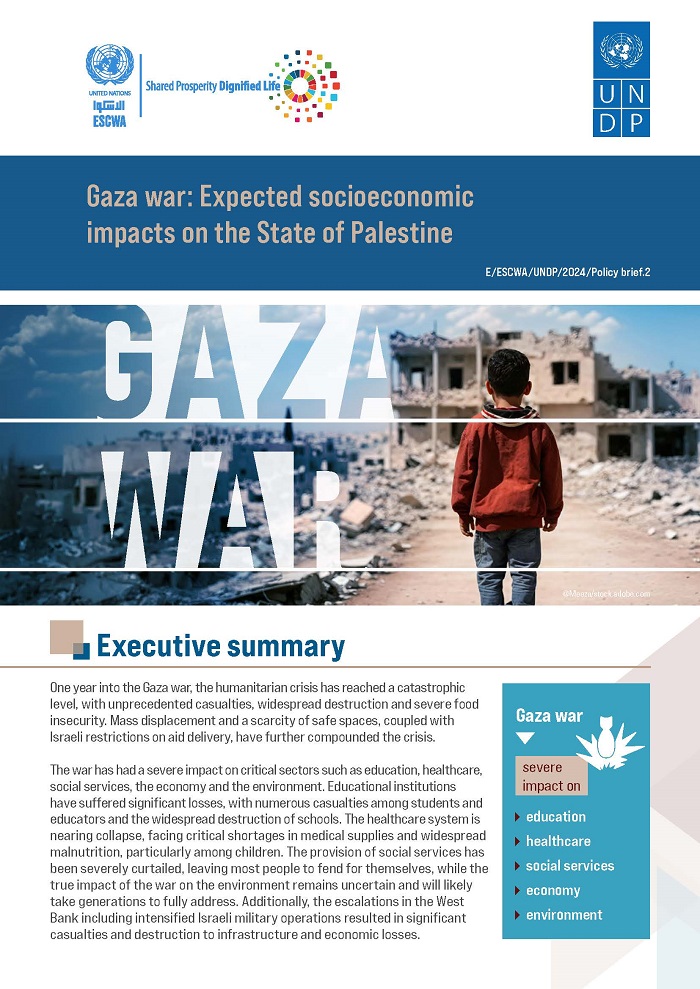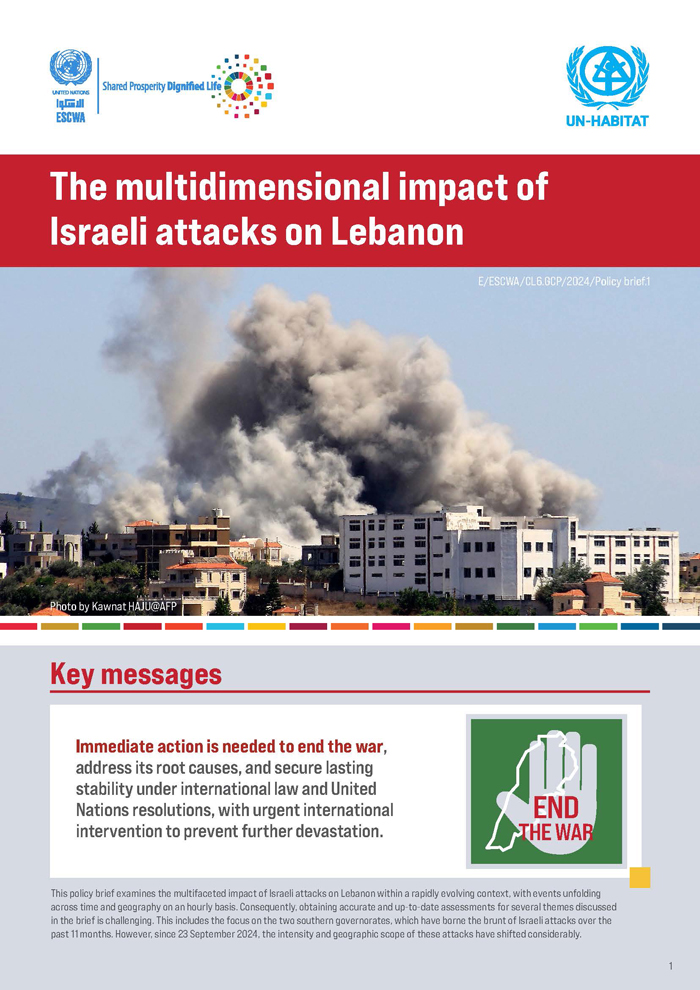
ESCWA Publication: E/ESCWA/UNDP/2023/Policy brief.1
Country: State of Palestine
Publication Type: Policy briefs
Cluster: Governance and Conflict Prevention
Focus Area: Population dynamics & migration, Resilient development & conflict prevention
Initiatives: Addressing multidimensional poverty, Financial & macroeconomic statistics for National accounts, Support to the Palestinian people
SDGs: Goal 1: No Poverty, Goal 2: Zero Hunger, Goal 3: Good Health and Well-Being, Goal 4: Quality Education, Goal 6: Clean Water and Sanitation, Goal 8: Decent Work and Economic Growth, Goal 9: Industry, Innovation and Infrastructure, Goal 11: Sustainable Cities and Communities
Keywords: Poverty, Unemployment, War, Social aspects, Economic aspects, Financial aspects, Medical aspects, Gross domestic product, Human development, Essential drugs, Violent deaths, War victims, Mental stress, Humanitarian assistance, Persons with disabilities, Displaced persons, Destruction of property, Food shortage, Agriculture, Water supply, Roads, Territories occupied by israel, State of palestine, Statistical data
Gaza war: expected socioeconomic impacts on the State of Palestine
November 2023
The present policy brief highlights some of the direct impacts of the Gaza war on the lives of Palestinians. It estimates losses in gross domestic product and shows the effects of Israeli measures and military operations on the health system in Gaza, which is already enduring the long-term effects of the 16-year blockade and previous military escalations. Early estimates, using ESCWA computable general equilibrium (CGE) model simulations, indicate that the shock to Palestinian economic activity has been severe. This is the result of the total siege of Gaza, destruction of capital, forced displacement, restrictions on movement of people and goods in the West Bank, and suspension/deduction of tax transfers from Israel to the Palestinian Authority. In addition, poverty is expected to rise sharply, between 20 and 45 per cent depending on the duration of the war. By the beginning of the third week of the war, nearly all of the Gazan population is estimated to have become multidimensionally poor (96 per cent) based on the national multidimensional poverty index. The brief concludes that economic recovery in Gaza following a ceasefire will not be immediate, considering the large-scale destruction and uncertain access to resources, including materials and equipment owing to the siege on Gaza. Failing to address the root causes of the protracted conflict will render any economic recovery efforts in Gaza and the rest of the occupied Palestinian territory insufficient and short lived.
Related content
Population dynamics & migration
, Resilient development & conflict prevention
,
The present policy brief highlights some of the direct impacts of the Gaza war on the lives of Palestinians. It estimates losses in gross domestic product and shows the effects of Israeli measures and military operations on the health system in Gaza, which is already enduring the long-term effects of the 16-year blockade and previous military escalations. Early estimates, using ESCWA computable general equilibrium (CGE) model simulations, indicate that the shock to Palestinian economic activity has been severe. This is the result of the total siege of Gaza, destruction of capital, forced displacement, restrictions on movement of people and goods in the West Bank, and suspension/deduction of tax transfers from Israel to the Palestinian Authority. In addition, poverty is expected to rise sharply, between 20 and 45 per cent depending on the duration of the war. By the beginning of the third week of the war, nearly all of the Gazan population is estimated to have become multidimensionally poor (96 per cent) based on the national multidimensional poverty index. The brief concludes that economic recovery in Gaza following a ceasefire will not be immediate, considering the large-scale destruction and uncertain access to resources, including materials and equipment owing to the siege on Gaza. Failing to address the root causes of the protracted conflict will render any economic recovery efforts in Gaza and the rest of the occupied Palestinian territory insufficient and short lived.



